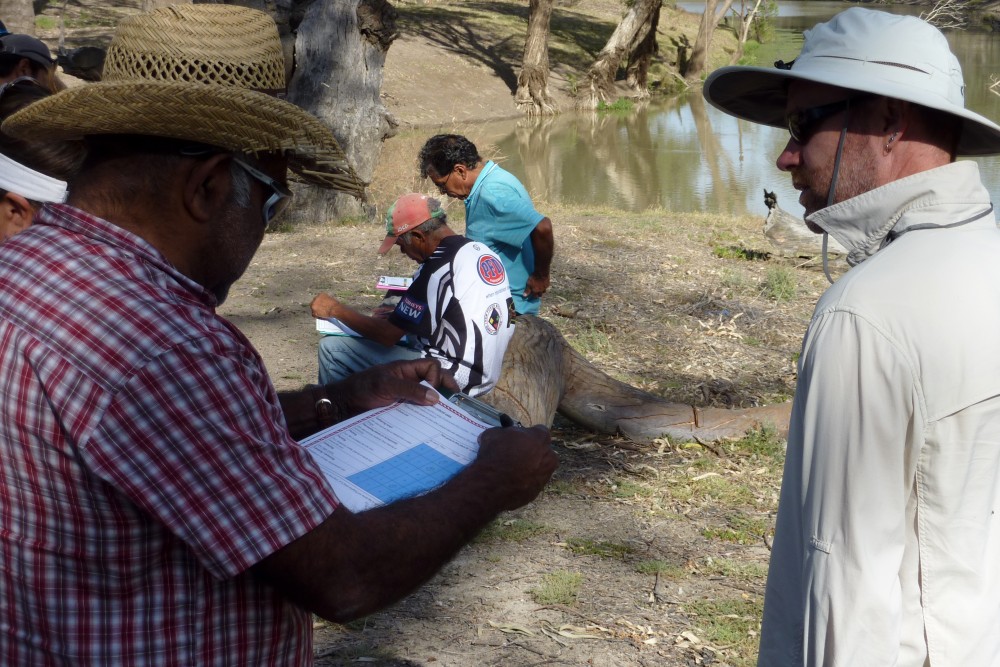It’s our last day in north central NSW, a land of wide open plains, and in the old days, as the poet Dorothea Mackellar had it, “of droughts and flooding rains”. We’ve seen precious little sign of the flooding rains. Irrigators own 75% of the water, and the rivers are now channels to move water around to the imperatives of the market.
The modestly good news is that under the new Basin Plan, 25% of flow must be allocated to environmental uses. I’m here in a project organised by the Murray Darling Basin Authority to trial a process for indigenous assessment of the health of river places that will put in front of water planners the priorities of Aboriginal communities.
I’m facilitating the action research, and I’m driving the bus.
I work my way carefully along the dirt track to the junction of two rivers, the first of two sites we’ll visit this morning. We’re close to the main town, at a place where local people have gathered and lived for a long time, and to which they return for picnics and swimming and fishing.
We spill out of the bus and the 4WD, stretching legs and lighting up, and settle into the comfortable twos and threes that have taken shape over the week. Conversations begin.
As usual, I bring my sense of being out of place culturally. But I’ve come to know these people a bit, and they me. I feel more at ease and more present in the relationships, listening and joining in without forcing things. There is a gentleness at work between us, and I notice that stories about the place are coming more easily. I wonder why.
We’ve gathered each morning, packed the vehicles, debated again where we’ll go first, and then there’s been the driving, yarning, standing together looking at a changed river, with all the sadness this brings, but a river nonetheless on Country, with its history, memories and obligations. We’ve gained a sense of each as a particular person, with a particular relationship to Country.
I’ve worried that our carefully designed form, with its many questions, is using indigenous knowledge as feedstock for another exercise in meeting the terms set by the centre. I’ve seen it in mainstream agricultural communities—the decision criteria set by management leach all the nuance out of people’s living knowledge of a landscape, leaving a skeleton of “facts”.
But we’ve been together, on Country, and the intimacy that’s developed between us seems to form a safe space where memory can surface stories of the place – stories of big floods, of swimming here as a kid, of what my mother told me about the old days, stories of how good the fishing used to be.
In these stories is the knowledge for making authoritative cultural assessment. Knowledge is held in story, and but stories aren’t shared with just anyone. Our process has been tuned to this, seeking people’s free, prior and informed consent at each step in the project. We built on relationships developed over years between MDBA staff and Aboriginal people. We developed the project in collaboration with the indigenous nations organisations in the Basin. We visited communities to invite them into the project well before we showed up to run the assessment week.
If I was writing a report, I might talk about the importance of trust, but if I speak from my own experience of the work, it feels like intimacy. I could call it trust, but the word “intimacy” has more feeling in it, more blood and more risk.
 The intimacy seems to hold as much for relationships between members of the Assessment Team as it does with us white fellas. The team are from different families, young people and older people, people who have always lived here and those who moved here through marriage or work. A week of assessing places on the rivers have brought us all closer together.
The intimacy seems to hold as much for relationships between members of the Assessment Team as it does with us white fellas. The team are from different families, young people and older people, people who have always lived here and those who moved here through marriage or work. A week of assessing places on the rivers have brought us all closer together.
In natural resource management, it’s often said that we need to integrate local and scientific knowledge. In the intimacy of this group of people feeling out a river and assessing it, what I find is an openness to differing ways of knowing, and to what those differences might bring to our shared knowing, if we are gently present to each other.


